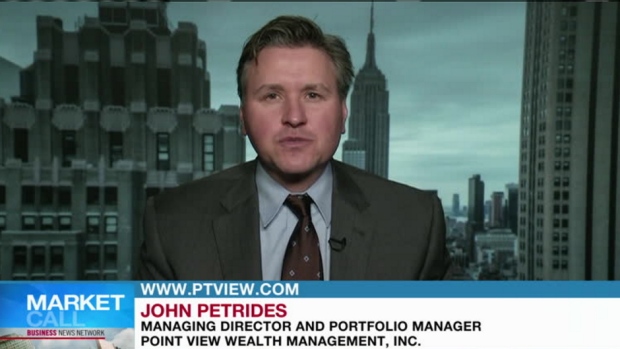Nov 29, 2016
John Petrides' Top Picks: November 29, 2016
BNN Bloomberg

John Petrides, managing director and portfolio manager at Point View Wealth Management, Inc.
Focus: U.S. equities
_______________________________________________________________
MARKET OUTLOOK
Risk assets are rallying post the Trump victory. Since the election, the S&P 500 is up over three per cent. Small-cap stocks, measured by the Russell 2000, are up over 11 per cent, rallying for 14 days in a row. November has been the second strongest month for stocks this year. On the other hand, gold and bonds are down sharply. The yield on the U.S. 10-year has widened 30 per cent from 1.8 per cent to 2.4 per cent. In the short term, it does appear that stocks have risen too far too fast, and bonds have done the same in the opposite direction. That being said, we continue to believe long-term investors should be overweight on equities, underweight on bonds and be fully invested with almost no cash. The main lesson emphasized, again, from the outcome of the U.S. presidential election is that investors have to be diversified. Similar to Brexit, investors were caught off guard with the outcome. Here, many pundits in the market presumed a Trump victory would lead to a sharp selloff, considering the S&P 500 sold off nine consecutive trading days leading up to election week, something the market had not done since 1980. The selloff did occur, but only lasted several hours. The market has exploded to the upside and has not looked back. All attention will now shift to the Fed and its decision on interest rates in December; odds favour a rate hike of 25 bps.
TOP PICKS
BAKER HUGHES (BHI.N)
Point View clients have owned BHI for many years, and we continue to be buyers. Baker Hughes was recently acquired by GE. The companies will form an oil and gas service partnership. Assuming the deal closes as expected in mid-2017, it will form the second largest oil service company by revenue only to Schlumberger. GE will control 62.5 per cent and BHI shareholders the rest. BHI shareholders will receive a one-time special dividend of $17.50. The combined company is expected to achieve $1.2 billion in synergies by 2020, which we think is conservative. BHI has a great balance sheet. They received a $3.5-billion breakup fee from Haliburton when that deal was not approved. If this deal with GE is not approved, then BHI shareholders will receive $1.3 billion from a breakup fee. Aside from the possibility of the price of oil falling hard, the downside risk looks minimal.
NESTLE (NSRGY.PK)
Point View clients have owned NSRGY for many years and continue to be buyers. Consumer defensive stocks look attractive now. The sector is down four per ccent since Trump’s victory. Nestle is down nine per cent since Brexit and six per cent since Trump’s victory. It is the largest maker of snack foods, has a 23 per cent stake in French cosmetics firm L’Oreal, has a fortress for a balance sheet, currently offers investors a 3.4 per cent dividend yield (which it has grown 10 per cent annually for the past decade), and is trading nearly in line, based on a price-to-earnings multiple, with the S&P 500 based on 2017 earnings. Historically, NSRGY has traded at a large premium to the market. We think the selloff of high-quality defensive stocks in favour of riskier, more volatile stocks post the election is overdone. The breadth of NSRGY’s offering and global market positioning reduces risk. Rapidly growing market penetration of emerging economies offers above-average growth opportunities.
ALLERGAN (AGN.N)
Point View clients have been purchasing shares of AGN post the Pfizer (PFE.N) failed merger. The healthcare sector is the worst-performing sector in the S&P 500 year to date. AGN is a specialty pharma player that owns a broad portfolio of specialty drugs and branded drugs, most notably the world’s best-known drug: Botox. AGN recently sold its generic drug business to Teva Pharmaceuticals for $40.5 billion. The company is using that cash to buy back stock, start a dividend and make strategic acquisitions to bolster its pipeline. Last November, the world’s biggest pharma, Pfizer, agreed to buy each Allergan share for Pfizer shares worth $352. When the deal aborted, Allergan’s stock price plummeted. The current price allows you to buy Allergan at a near 55 per cent discount to Pfizer’s bid. We think the market is undervaluing AGN’s cash flow position and drug pipeline.
| DISCLOSURE | PERSONAL | FAMILY | PORTFOLIO/FUND |
|---|---|---|---|
| BHI | N | N | Y |
| NSRGY | N | N | Y |
| AGN | Y | Y | N |
WEBSITE: www.ptview.com












